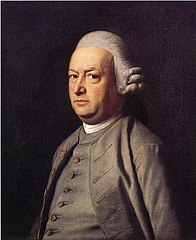The Rev. Jonathan Mayhew presided over the wedding on 14 Jan 1751 at the West Meetinghouse.
In reporting that wedding, the Boston Evening-Post called the bride “a Lady of great Beauty and Merit.” The Boston Post-Boy said she was “an agreable and virtuous young lady.”
That coverage strongly implies most people sympathized with Hannah in her decision to call off her engagement to Andrew Pepperrell the preceding fall after he had delayed their wedding one too many times. They didn’t blame her as the fickle one.
Flucker was a young merchant, seven years older than his bride. He had previously married a sister of James Bowdoin and been widowed in May 1750. Aside from his daughter named Sally born out of wedlock on a date I don’t know, Hannah and Thomas appear to have had a solid genteel New England marriage, with their first baby, also named Hannah, arriving at the end of 1751. Flucker went on to become the province’s royal secretary.
Andrew Pepperrell’s cousin William Tyler sent him the news:
I inform you that last Monday evening Miss Hannah was married to Mr. Fluker and appeared a bride at the West Church, New Boston, brought in her chariot. The talk is almost over, for everybody thinks and tells me they believe it is what you wanted, but more of this when I see you.Pepperrell doesn’t appear to have pined after his lost fiancée. He went back to his mansion in Kittery, Maine, and his rural social life. While returning from a ball in Portsmouth, New Hampshire, in February, he caught a cold. That became pneumonia. The Boston Evening-Post announced that he died on 1 March “after a short Indisposition.” The local minister preached a sermon in his memory.
Later authors wrestled with why Andrew Pepperrell had strung Hannah Waldo along for so long. Was he prone to ill-timed “despondency” or depressions? Was he interested in someone else? Did he resent and resist his father’s arrangements? Most of Andrew’s papers were destroyed, making it even harder to know. (Not knowing the facts didn’t bother other authors who exaggerated the young man’s death, suggesting he went mad or died of a broken heart two days after Hannah Waldo’s send-off.)
Sir William Pepperrell was left without a son to carry on his name. He made the eldest son of his daughter Elizabeth Sparhawk heir to his fortune and baronetcy on the condition that that young man take the surname Pepperrell. The first Sir William Pepperrell died in 1759. The second became a Loyalist exile.
Hannah’s father, Samuel Waldo, also died in 1759 while overseeing his property in Maine. Most of his descendants became Loyalists, but one exception was Thomas and Hannah Flucker’s daughter Lucy, who married Henry Knox. Through careful management of family claims, the U.S. Secretary of War gained (nominal) control of most of the Waldo Patent.
And that couldn’t have happened except for the long, unhappy engagement of Hannah Waldo and Andrew Pepperrell.

That's such a good story. Thank you for assembling all the pieces of the puzzle!
ReplyDelete